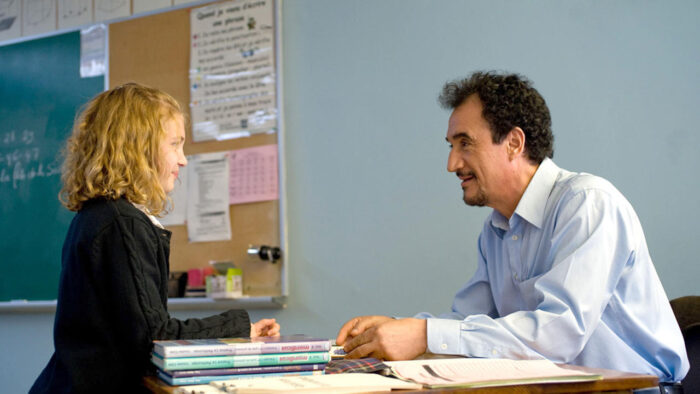MUBI Mondays: Monsieur Lazhar (2011)
Review Overview
Not the teacher movie you think
8Performances
8Josh Slater-Williams | On 14, Sep 2020
On Mondays, two of our resident cinephiles highlight a film currently available on MUBI UK. We call it MUBI Mondays.
Monsieur Lazhar was Canada’s submission for the Best Foreign Language Film category at the Oscars ceremony of 2012, making it to the final five nominees but losing to Asghar Farhadi’s A Separation. On a surface level, that Monsieur Lazhar concerns a new teacher changing the perceptions and lives of a group of students may make it seem like an ideal, easy target to which the Academy might take a shine. Philippe Falardeau’s film, though, is a much different – and better – beast.
Set in Montreal, the film opens with schoolboy Simon (Émilien Néron) rushing into class early for his turn at milk duty, only to find his teacher dead and hanging from their classroom’s ceiling. His classmate Alice (Sophie Nélisse) also sees the body as the rest of the pupils initially enter the building but are quickly turned away at the behest of the staff. Weeks later, the heads of the reopened school attempt to deal with the death’s impact on the late Martine Lachance’s class, arranging child psychiatrist sessions for the close-knit group. A substitute is required for the remainder of the school year, but the principal (Danielle Prouix) has not advertised the position yet. However, a man named Bachir Lazhar (Mohamed Fellag), an Algerian immigrant, wanders into her office and offers his services; living locally, he is aware of the school’s situation and wishes to help.
While teaching, Bachir’s methods prove old-fashioned and provoke queries on behalf of both staff and parents. Due to his outsider status, his lack of comprehension of Canadian culture also makes him a target for criticism. Outside of the classroom, Bachir meets in court to make his case for refugee status, having fled to Canada to set up a life for his wife, their two children and himself. Before they could join him, his family tragically perished in a house fire, an incident Bachir believes to be no accident. Within the school environment, the two students Simon and Alice quarrel over issues related to their late teacher. Concerned by the various outbursts and empathetic to the concept of vocalising one’s grief, Bachir tries to encourage the children to talk about Martine’s suicide, much to the displeasure of his new colleagues.
While Monsieur Lazhar may superficially belong to the inspirational teacher subgenre arguably popularised in the modern era by Dead Poets Society – with the additional element of having the teacher be a mournful outsider – it outright avoids the overt sentimentality and broad strokes of Hollywood fare such as Dangerous Minds and Mona Lisa Smile. In contrast to the storytelling generally implemented in those films, Monsieur Lazhar is slow of pace, deliberate in its execution, and subtle in its character development. It bears far closer resemblance to something like Laurent Cantet’s The Class in regards to nuance and casual narrative, although not so much style; there’s no quasi-documentary aesthetic to be found in Falardeau’s film.
The film’s most interesting thematic content comes from its examination of how we cope with grief. The elementary school staff want to help the children process the tragedy, but they are unable to do so in any effective way due to fearful governing bodies and regulations. Not prone to conforming to expected teacher-student relations, reasons for which become clear as more of his history is revealed, Bachir has no qualms with giving his young charges an outlet to discuss the devastation. For Bachir himself, the teaching job with these traumatised youths is a way of working through the loss of those who also meant a great deal to him. The viewer learns that his wife wrote a book that controversially spoke out against an Algerian policy of national reconciliation, which led to the pardoning of all kinds of criminals and terrorists. Bachir has some similar inclinations to his late wife, showing suspicion of piety towards the late Martine, openly criticising her for what her actions have caused; through this element the film draws parallels between Bachir’s own grief and that of the class.
One especially refreshing aspect, and one relatively unique for an effort focused on children, is an avoidance of pushing a clear moral doctrine; uncertainty runs throughout. The reasons for Martine’s suicide are unclear, but there is suspicion, especially from Alice, that Simon’s actions may have played a key part. The troubled boy rejected a hug from his teacher during a tutoring session, and then proclaimed to any and all parties that she tried to kiss him. Martine’s former colleagues discuss how her levels of physical affection, reflecting her enthusiasm and caring nature, were perhaps inappropriate, yet they also bemoan the problems of maintaining a physical distance from students. The profession is therefore filled with all these anxieties and uncertainties, and Martine’s suicide appears directly influenced by all the uncertainty; as the film progresses, the death seems more and more like an act of martyrdom.
The film makes no clear comment in this questioning of whether pain and grief perpetuated by a child’s words can be just as devastating as that caused by the targeted murder of the kind that saw Bachir’s family perish. It also avoids strictly taking his side completely, fully presenting the questionable nature of his relationship with these children. Anchored by beautifully realised turns from Mohamed Fellag, Sophie Nélisse and Émilien Néron, Monsieur Lazhar is a quiet, smart drama of great power.
Monsieur Lazhar is now available on MUBI UK, as part of a £9.99 monthly subscription.



















